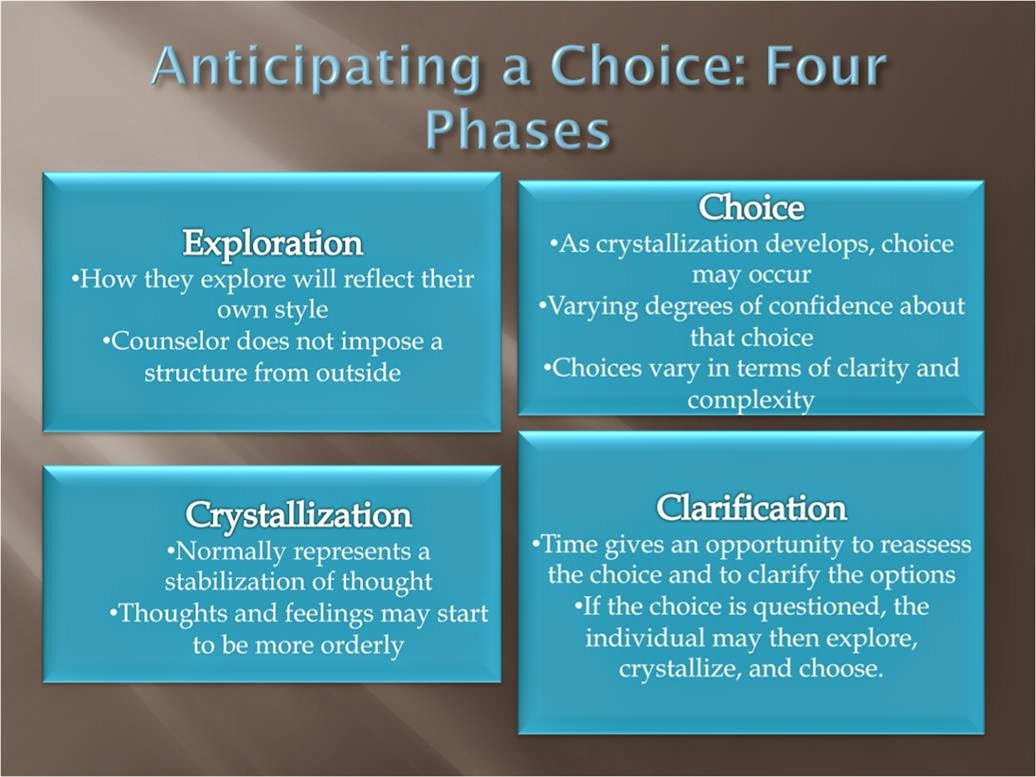Linda Gottfredson
Gottfredson developed a career development theory for children and adolescents known as Circumscription,
Compromise, & Self Creation that was published in 2002.
Gottfredson argues that individuals' occupational choices are made in an attempt to fit into the broader social order. Specifically she notes that choices are made in relation to gender role and fit with a job (most important), the
prestige of the career (second most important), and lastly how the job matches one's personality and preferences.
Gottfredson further states that circumscription
is the eliminating of possible careers based upon gender and prestige and that
this begins at a fairly young age.
Circumscription has 5 guiding values:
Circumscription has 5 guiding values:
1. Children
are trying to understand and organize complex information about the world &
themselves.
2. Occupation
is about enhancing self-concept.
3. Children
begin wrestling with societal views of individuals, with views on gender first, prestige second, and later, both simultaneously.
4. Occupational
choices/options are continually restricted further and further as children and
their understandings/views grow more complex.
The process of adding occupations back into consideration only takes
place when considerable changes in social environment or a significant learning
experience alters one's view of the world.
5. Circumscription
is gradual and may go unnoticed by us as individuals.
Compromise is what Gottfredson says that we do, as individuals, by setting aside (or not) our preferences in our career pursuits to instead focus on occupations that are more easily achievable or socially acceptable.
Compromise is what Gottfredson says that we do, as individuals, by setting aside (or not) our preferences in our career pursuits to instead focus on occupations that are more easily achievable or socially acceptable.
Four stages of
child cognitive development according to Gottfredson:
1. Size
and Power (age 3-5): kids realize the difference between themselves and adults
2. Orientation
to Gender Roles (age 6-8): children begin to observe, learn, and therefore
apply, in their own views, what is acceptable for males and females (both generally as well as possible career considerations).
3. Orientation
to Social Value (age 9-13): Children begin to understand and consider views of
others based upon socioeconomic status and societal approval, or lack thereof, because of their place/role in society.
This begins to impact individuals perceived occupational possibilities based
upon where they see themselves in society and what type of work (effort) they
are willing to put forth in their career/job.
4. Orientation
to the Internal, Unique Self (age 14 and above): individuals begin to develop
their own sense of individuality and their own view of themselves comes into
view. As a result, individuals begin thinking
about which careers match who they see themselves as and what they see themselves
doing.
Gottfredson says that in the past, career development instruction and assistance for young people has happened in stage 4.
She thinks all stages should be involved in the development process, keeping the following things in mind:
1. Should
be age appropriate.
2. Don’t
overwhelm kids but expose them to full breadth of career options.
3. Help
kids understand circumscription and alternatives so that they can put into
words the reason(s) why they are making the choices they are.
4. Factors
in circumscription process (gender, socioeconomic status, abilities, and
preferences) should be named and understood.A blogger has summarized Gottfredson's theory pretty well at the following website:
http://www.sidewaysthoughts.com/blog/2013/06/did-you-inherit-your-career-gottfredsons-theory-of-circumscription-and-compromise/







